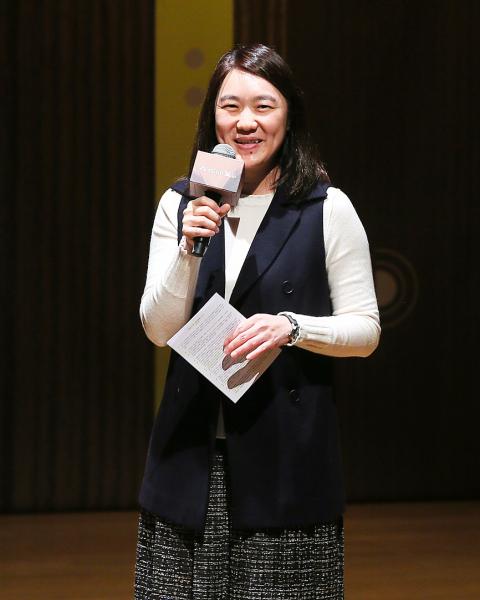Eslite Spectrum Corp (誠品生活), which runs the Eslite bookstore chain (誠品書局) and other businesses at home and abroad, is mulling opening new outlets in Southeast Asia, although bookstore operations remain unprofitable, chairwoman Mercy Wu (吳旻潔) said yesterday.
The Taipei-based conglomerate is studying the possibility of making inroads in Southeast Asia in line with plans to strengthen its cultural innovation business, including 50 bookstores in Taiwan, Hong Kong, China and Japan, Wu said.
“Today, profitability continues to pose the biggest challenge for Eslite as it turns 30 years old this year,” Wu told a news conference in Taipei, while announcing the bookstore chain’s annual report on reading behaviors and market trends.

Photo: CNA
Wu, who took over the company’s reins in 2017 after the sudden death of her father, Robert Wu (吳清友), said that the bookstores had to increase capital by NT$2 billion (US$65.56 million) over the years to stay in business.
The company has identified 100 sources of losses, but has yet to find a profitable business model, she said, adding that no enterprise in the world can live off running bookstores as its core operation.
Eslite Spectrum also runs department stores and restaurants, and sells appliances and equipment for hotels, restaurants, kitchens and wine cellars.
Malaysia appears the most likely venue, as 25 percent of its population is ethnic Chinese, making expansion easier, Mercy Wu said.
Hopefully, the bookstore chain can cast off its “unprofitable” shackles to prolong its existence, Mercy Wu said, adding that she is to keep the passion for cultural business alive.
Eslite Spectrum reported that consolidated revenue increased 18.14 percent year-on-year to NT$4.31 billion in the first 10 months of this year.
In the first three quarters, net income fell 29.31 percent to NT$184.01 million, or earnings per share of NT$3.88, company data showed.

GROWING OWINGS: While Luxembourg and China swapped the top three spots, the US continued to be the largest exposure for Taiwan for the 41st consecutive quarter The US remained the largest debtor nation to Taiwan’s banking sector for the 41st consecutive quarter at the end of September, after local banks’ exposure to the US market rose more than 2 percent from three months earlier, the central bank said. Exposure to the US increased to US$198.896 billion, up US$4.026 billion, or 2.07 percent, from US$194.87 billion in the previous quarter, data released by the central bank showed on Friday. Of the increase, about US$1.4 billion came from banks’ investments in securitized products and interbank loans in the US, while another US$2.6 billion stemmed from trust assets, including mutual funds,

AI TALENT: No financial details were released about the deal, in which top Groq executives, including its CEO, would join Nvidia to help advance the technology Nvidia Corp has agreed to a licensing deal with artificial intelligence (AI) start-up Groq, furthering its investments in companies connected to the AI boom and gaining the right to add a new type of technology to its products. The world’s largest publicly traded company has paid for the right to use Groq’s technology and is to integrate its chip design into future products. Some of the start-up’s executives are leaving to join Nvidia to help with that effort, the companies said. Groq would continue as an independent company with a new chief executive, it said on Wednesday in a post on its Web

JOINT EFFORTS: MediaTek would partner with Denso to develop custom chips to support the car-part specialist company’s driver-assist systems in an expanding market MediaTek Inc (聯發科), the world’s largest mobile phone chip designer, yesterday said it is working closely with Japan’s Denso Corp to build a custom automotive system-on-chip (SoC) solution tailored for advanced driver-assistance systems and cockpit systems, adding another customer to its new application-specific IC (ASIC) business. This effort merges Denso’s automotive-grade safety expertise and deep vehicle integration with MediaTek’s technologies cultivated through the development of Media- Tek’s Dimensity AX, leveraging efficient, high-performance SoCs and artificial intelligence (AI) capabilities to offer a scalable, production-ready platform for next-generation driver assistance, the company said in a statement yesterday. “Through this collaboration, we are bringing two

Even as the US is embarked on a bitter rivalry with China over the deployment of artificial intelligence (AI), Chinese technology is quietly making inroads into the US market. Despite considerable geopolitical tensions, Chinese open-source AI models are winning over a growing number of programmers and companies in the US. These are different from the closed generative AI models that have become household names — ChatGPT-maker OpenAI or Google’s Gemini — whose inner workings are fiercely protected. In contrast, “open” models offered by many Chinese rivals, from Alibaba (阿里巴巴) to DeepSeek (深度求索), allow programmers to customize parts of the software to suit their